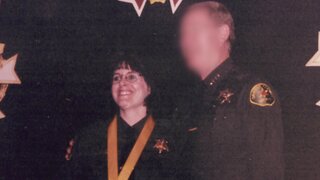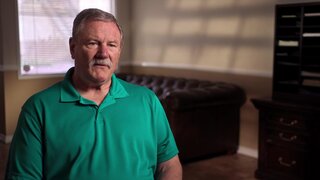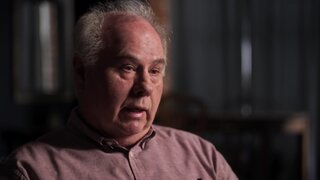Create a free profile to get unlimited access to exclusive videos, breaking news, sweepstakes, and more!
Botched Contract Murder Leaves Loving California Mother ‘Basically Executed’
A case of mistaken identity put Jane Carver in the crosshairs of a gunman willing to kill to escape the grip of a lethal loan shark.
On June 10, 1995, Jane Carver, a married mother of two known for her twinkly personality, had that light snuffed out.
Returning from her morning run, the 46-year-old flight attendant was half a block from home in Fountain Valley, California, when she was shot in the face and killed.
She was “basically executed,” Lt. Kim Brown, former lead investigator for the Fountain Valley Police Department, told “The Real Murders of Orange County,” streaming now on Oxygen.com.
On the afternoon of the murder, her husband, Albert Carver, told the Los Angeles Times, “I’m just devastated … falling apart right now. Imagine what it’s like to see your wife lie dying in a flower bed.”
The sun-kissed serenity of the upscale community was shattered by the inexplicable violence. With just a bullet case left at the crime scene to go on, investigators relied on eyewitnesses who described the killer’s demeanor as “casual” and “calm.”
Witness accounts led to a sketch of a Black male who was thin and 30-40 years old and drove an American-made, 1980s two-door hatchback.
But while police had a good idea of what the shooter and his car looked like, his motive was a total mystery. Jane hadn’t been robbed or assaulted. Had she angered someone? Was she involved in a relationship gone bad?
Detectives dug deep and regarded everyone as a suspect, including the victim’s family members. Albert agreed to take a polygraph test and passed, ruling him out as a suspect, Brown told producers.
The couple’s sons, Justin and Clifford, at the time ages 14 and 20, respectively, were also interviewed. “It was a process,” Justin told producers. “All you can do is provide as much as you can.”
The victim’s friends and colleagues aided with the search in their own ways. They blanketed local businesses with flyers. A reward of $45,000 was pulled together, but progress still stalled. Nearly 10 months went by without a suspect.
A lead would eventually come 30 miles south in San Clemente. There, James Wengert, a 51-year-old businessman on his way to work, was shot in the face in a parking garage on April 10, 1996, the Los Angeles Times reported at the time.
“Execution-style shootings were very unusual in Orange County,” Capt. Christine Murray, a retired OC Sheriff’s Department investigator who worked that case, told producers.
The shooting of Wengert, who survived, led investigators to his contentious relationship with Coleman Allen, co-founder of Premium Commercial Services Corp., a Huntington Beach finance company.
To keep his business afloat Wengert had secured a loan with Allen, who the Associated Press in 1996 described as a “bottom-feeder of finance.” Allen forced Wengert to take out a very large life insurance policy naming Allen as the beneficiary in return.
The shady business methods set off alarm bells. Detectives looked into whether Allen could be forcing debtors to take out life insurance policies naming himself and his company as the beneficiary and profiting by having them killed.
“Two other law enforcement agencies in southern California had active investigations targeting Cole Allen for fraud and financial crimes in a very sophisticated way,” Murray told producers.
The connection to Allen was very promising, but there was a snag. Allen had died of natural causes, a massive heart attack, days before Wengert was shot. Although this trail led to more questions than answers, investigators searched Premium Commercial records for possible leads.
Murray was also struck by the overt similarity between the attempt on Wengert’s life and the murder of Jane Carver. Investigators reached out to the Fountain Valley police about the commonalities and breathed new life back into the Carver investigation — but only briefly. The Carvers had never heard of Allen and had no ties to him.
Jane’s family began to fear that the homicide would go unsolved. But soon enough, a break came, thanks to a shocking phone call.
About 10 days after Wengert was shot, Allen’s widow received a call from a stranger who identified himself as the triggerman who pumped a bullet into Wengert and believed he’d killed him. He said Allen hired him to carry out the hit and he expected to be paid.
Investigators identified the caller as Paul Alleyne, who owned an auto parts company and had secured a loan through Allen. Alleyne owed $30,000 at 36% interest compounded annually, according to “The Real Murders of Orange County.” He couldn’t keep up with the crushing payments.
A possible explanation emerged: Allen may have offered to forgive Alleyne’s debt in exchange for executing Wengert.
Murray questioned Alleyne, who was shocked to hear that Wengert was alive and had identified him as the man who shot him. Alleyne chalked that accusation up to racism. “Us Black guys must all look alike to an old white dude,” the suspect said, Murray told producers.
Murray countered by saying that she’d never said Wengert was old or white. He knew Wengert’s race and age, she reasoned, because he was the shooter.
She asked Fountain Valley police to use Alleyne’s photograph in a lineup with witnesses in the Carver case, but witnesses didn’t identify him as a match.
Murray continued to look for more clues from Alleyne. Going through the transcript of his interrogation, she found one that would eventually crack the Carver case open.
During the interview Alleyne had casually remarked that Allen was angry at someone named Leonard Mundy for shooting the wrong person.
Going through Premium Commercial documents again, Murray found that Mundy was another small businessman who had taken out two loans with Allen and was desperate to escape his debt. Records also revealed that Wengert and his wife, Margaret, aka Peggy, had a home close to the Carver residence.
In an interview with Murray, Peggy Wengert explained that her husband secretly had used their Fountain Valley house as collateral to obtain a business loan from Allen. She sued Allen, who was furious at her. That case was set to be underway in June 1995.
Investigators theorized that Allen had been after Peggy Wengert, not Jane Carver. En route to check out the Wengert house in Fountain Valley, Murray told producers she made a wrong turn and ended up closer to the Carver home than the Wengerts’. She wondered if a hired hit man could have made the same mistake: wrong home, wrong victim.
Mundy’s picture was included in a photo lineup and witnesses positively identified him as Carver’s shooter.
“There was no doubt that that was our suspect … I was just so pleased that finally we had found him,” Brown told producers.
A jury convicted Mundy of first-degree murder. He was sentenced to life in prison without parole. Alleyne was convicted of trying to kill Wengert and sentenced to 29 years to life in prison.
In 2000, Alleyne appealed his conviction, but lost.
To learn more about the case, watch “The Real Murders of Orange County” on Oxygen.com.

























